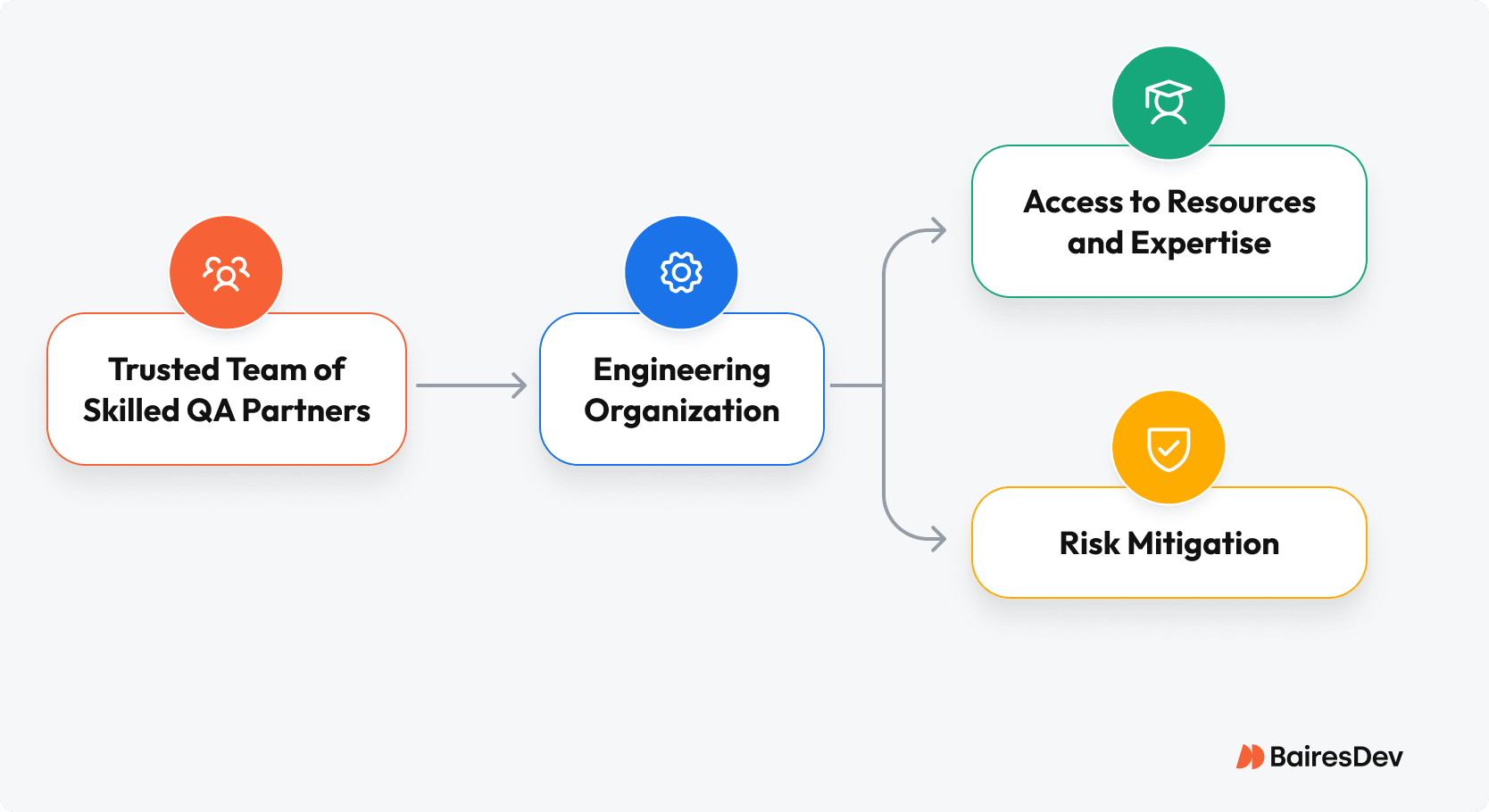Every VP of Engineering and CTO knows the tension: leadership expects faster delivery, customers expect flawless products, and development teams are already stretched. Hiring more engineers locally isn’t realistic. Recruiting takes months, budgets are constrained, and onboarding consumes time you don’t have.
Cutting corners on quality assurance isn’t an option. A late-stage bug, performance failure, or missed compliance requirement can wreck a release and undermine confidence at the executive level.
That’s where outsourcing QA becomes a strategic tool.

Outsourcing QA isn’t about handing off repetitive testing to the lowest-cost provider. It’s about embedding a partner with a proven track record, a dedicated team of skilled testers, and the advanced tools to strengthen your entire quality function.
With the right provider, QA outsourcing gives you immediate access to specialized expertise, supports risk mitigation, and allows your engineers to stay focused on core business functions. It’s no surprise that 60% of global organizations now outsource testing, with most citing cost efficiency and improved software quality as the primary drivers, according to Global Growth Insights.
How QA Outsourcing Fits Into the Development Process
A strong provider doesn’t just deliver test cases. They integrate directly into your process.
A professional vendor plugs into existing development workflows, using the same project management toolset your developers rely on. They establish clear communication channels, align testing services with your business needs, and embed QA across the entire software development lifecycle.
Automation testing is woven into your continuous integration and delivery pipelines, ensuring new code is validated continuously and reliably. Quality benchmarks are set through QA consulting, and metrics are tracked throughout the testing cycle, giving leaders visibility into progress and risks. This makes QA outsourcing feel like a natural extension of your team.
Instead of carrying the overhead of a large in-house team, outsourcing provides immediate access to skilled testers, advanced testing tools, and specialized expertise. That means you can expand QA coverage from planning and design through release and maintenance—without adding headcount or slowing velocity.
For leaders under pressure to deliver faster while maintaining quality, outsourcing quality assurance testing isn’t a replacement. It’s an intelligent scale—an operating model that brings predictability, flexibility, and measurable results.
Why Senior Leaders Choose QA Outsourcing
From the executive perspective, QA outsourcing is a business decision, not a technical experiment. It’s about delivery velocity, predictable quality metrics, value-driven spending, and risk management.
| Business Challenge | Why QA Outsourcing Helps |
|---|---|
| Escalating Testing Demands | Internal resources can’t always keep up with growing testing requirements. Outsourced software testing services provide flexible capacity that scales with project needs. |
| Persistent Open QA roles | Many organizations struggle to fill QA engineer positions quickly. Outsourcing closes those gaps by supplying a dedicated team of testers without recruiting delays. |
| Regulatory and Compliance Pressures | In industries where compliance, security testing, and accessibility testing are mandatory, outsourced quality assurance ensures these requirements are consistently met. |
| Multi-Platform Support | Supporting web, mobile, and integrations often stretches in-house teams thin. Outsourcing provides expert hands across platforms without fragmenting internal focus. |
For many organizations, outsourcing these services provides flexibility and stability without sacrificing quality, while reducing the management burden.
5 Core Benefits of QA Outsourcing
1. Faster Delivery with Cost Efficiency
Deadlines are unforgiving. Late-stage bugs or quality failures delay launches, inflate costs, and erode trust. QA outsourcing embeds testing into the development process early, identifying defects in the testing cycle before they cascade into release blockers.
Financially, the model delivers clear cost efficiency. Hiring an in-house team comes with salaries, benefits, payroll taxes, recruiting fees, and management overhead. Outsourcing gives you flexible access to experienced testers and a dedicated team when needed, without the fixed cost or a 3-month procurement.
That flexibility means QA services can scale up for peak demand and scale down once releases stabilize, while improving key performance indicators such as time-to-market and defect rates.
2. Access to Specialized Expertise and Advanced Tools
Modern software development is complex. A single product may require integration, mobile, regression, and security testing. Meeting these needs in-house would require a broad set of specialized skills that most teams can’t realistically maintain.
An outsourced QA team provides engineers with deep experience in test automation, exploratory testing, and mobile app testing. They bring familiarity with the latest testing tools, advanced testing tools for automation and performance analysis, and a fresh, objective perspective on your software products.
This breadth is especially critical in industries that require compliance or support across multiple platforms. A strong provider leverages automation testing for speed and manual testing for nuance. For leaders, this isn’t just about QA services—it’s about having confidence that specialized skills and cutting-edge technologies are available on demand.
3. Comprehensive Test Coverage for Reliable Software
Software can fail in countless ways. A checkout flow may work in Chrome but fail in Safari. An integration might stall under heavy traffic. A mobile app might meet functional requirements but fail accessibility.
Outsourcing QA services extends your reach. A professional QA team combines both manual and automation testing. They validate experience and compliance through usability and accessibility testing. Finally, they ensure the product’s scalability through performance testing.
The result is more reliable software products delivered with fewer surprises. Instead of hoping your in-house team has time for thorough testing, you gain confidence that every release has been validated against business needs and customer expectations.
4. Proactive Risk Mitigation and Compliance
Engineering leaders aren’t just measured on delivery—they’re accountable for risk. A critical bug, data breach, or compliance violation can have lasting business consequences.
Outsourced QA testing strengthens your risk management posture. Security testing isn’t just a checkbox. As IBM reports, the average cost of a data breach hit $4.88M in 2024. With a defined QA process and a quality management system, testing experts identify vulnerabilities early. Security testing protects sensitive data, performance testing validates stability under load, and compatibility testing ensures systems run reliably across environments.
The emphasis is on proactive protection rather than reactive fixes. By outsourcing QA, you’re not just catching defects—you’re protecting brand reputation, meeting regulatory obligations, and safeguarding customer trust.
5. Keeping Internal Teams Focused on Core Competencies
Your engineers are hired to innovate, not to run endless regression testing cycles.
Your developers can prioritize feature delivery and product strategy, while outsourced QA testing ensures stability and compliance. Your team remains free to innovate while dedicated, outsourced QA engineers manage the testing process.
The integration can be seamless when clear communication channels and project management tools are established and properly used. This balance keeps your internal talent focused on feature development and strategy while outsourced QA testing protects the stability and reliability of your releases.
The Strategic Imperative
For engineering leaders balancing delivery speed, risk, and innovation, QA outsourcing is a proven way to scale intelligently. A conversation with the right partner can help you assess how quickly additional QA capacity could reduce risk and accelerate your roadmap.






